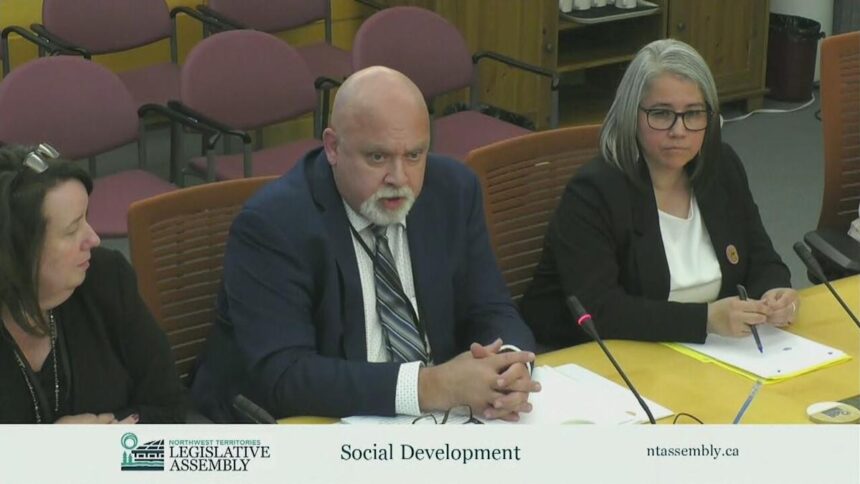I still recall the afternoon light filtering through the blinds at Stanton Territorial Hospital last November. Ashley Coombs, an expectant mother from Yellowknife, described the moment she learned her delivery would need to happen 1,500 kilometers away in Edmonton due to staff shortages.
“It felt like the ground just dropped away,” she told me, absently rubbing her rounded belly. “This is my first baby. I wanted my mom here, my sister. Not in some strange city where I know no one.”
Ashley’s experience has become distressingly common across the Northwest Territories, where the healthcare staffing crisis has transformed from an administrative challenge into what many residents describe as a full-blown humanitarian emergency. This week, territorial legislators publicly confronted health officials in a tense committee meeting that laid bare both the depth of the crisis and the fraying patience of communities.
“We’ve been raising alarms about this for years,” MLA Caitlin Cleveland told health department officials during Wednesday’s session at the Legislative Assembly. “At what point do we call this what it is—a system in collapse?”
The numbers support Cleveland’s characterization. According to data presented at the meeting, vacancy rates across the territory’s health authority have reached 30% for nursing positions, with some remote communities facing rates exceeding 50%. The Beaufort-Delta region currently operates with just 7 of its allocated 16 physician positions filled.
These shortages have triggered cascading service reductions throughout 2023 and into 2024. Stanton Territorial Hospital has temporarily closed obstetrical services four times in the past year. Inuvik Regional Hospital operates at reduced capacity, while community health centers in smaller communities like Fort McPherson and Tulita frequently shut down, forcing residents to travel hundreds of kilometers for basic care.
For Bruce Green, a 73-year-old elder from Fort Smith, these disruptions nearly proved fatal. “I had chest pains, but our health center was closed. My daughter drove me three hours to Hay River,” he explained during our conversation at his home last month. “The doctor there said if we’d waited another hour, I might not have made it.” Green now keeps a small suitcase packed in case he needs to evacuate for medical reasons.
Health Minister Lesa Nasogaluak faced pointed questions from MLAs about the territory’s reliance on southern locum physicians and travel nurses, which cost the system approximately $50 million annually—more than double what was budgeted. This financial pressure comes as the territory is already struggling with limited resources stretched across vast geography.
“We’re spending premium rates for temporary solutions while failing to address the fundamental issues that would help us recruit and retain permanent staff,” said MLA Kieron Testart during the session. “Housing shortages, inadequate professional support, burnout—we know what the problems are.”
Dr. Erin Crawford, who worked as a family physician in Yellowknife for seven years before leaving in 2022, echoed these concerns when I interviewed her via video call from her new practice in British Columbia. “The workload was unsustainable and growing worse,” she explained. “We were constantly in crisis mode, covering for unfilled positions while trying to provide quality care. Eventually, it affects your own health.”
The Canadian Medical Association has been tracking healthcare staffing nationwide, noting that northern and remote regions face particular challenges. Their 2023 Workforce Survey indicated that 64% of physicians reported higher levels of fatigue and burnout compared to pre-pandemic levels, with numbers significantly higher in rural and remote communities.
Indigenous communities face additional layers of challenge. In Deline, a fly-in community on Great Bear Lake, community health representative Mary Tutcho described how cultural disconnection compounds medical staffing issues. “When we get a new nurse every few months, they don’t know our people, our language, our ways of healing,” she said during a community gathering I attended in February. “Each time, we start from zero trying to build that trust.”
The territorial government has implemented several measures aimed at addressing the crisis. Last year, they introduced a northern recruitment bonus of $30,000 for hard-to-fill positions and expanded their educational support program for residents pursuing healthcare careers. In January, they opened a new staff housing complex in Yellowknife with 45 units prioritized for healthcare workers.
During this week’s committee meeting, health authority CEO Kim Riles acknowledged the gravity of the situation but emphasized that NWT faces the same challenges as many jurisdictions. “We’re competing for healthcare professionals in a global marketplace where almost everyone is understaffed,” Riles explained. “But we’re making targeted investments in retention and workplace culture that we believe will yield results.”
For many residents, however, these measures feel insufficient against the scale of the problem. Yellowknife North MLA Rylund Johnson pushed officials on the lack of a comprehensive emergency staffing plan. “We’re not just another jurisdiction facing challenges,” he argued. “Our system is at a breaking point, and we need to act accordingly.”
The Canada Health Transfer, which provides federal funding to provincial and territorial healthcare systems, has been criticized by northern leaders as inadequate for addressing the unique challenges of delivering care across vast, sparsely populated regions. The territorial government continues to advocate for a northern healthcare premium that would acknowledge these distinctive needs.
As the committee meeting concluded, Nahendeh MLA Shane Thompson reflected the frustration felt by many communities: “These aren’t just statistics we’re talking about. These are our elders, our children, our pregnant mothers who deserve better than a healthcare system that’s constantly on the verge of collapse.”
For Ashley Coombs, who delivered a healthy baby girl in Edmonton in December, the experience left lasting concerns about raising a family in the North. “I love this land, I want to stay,” she told me when I visited her after her return home. “But how can I feel secure knowing that next time, services might not be available even for emergency care?”
As the territory continues navigating this crisis, residents like Ashley find themselves caught between their deep connection to their northern home and the uncertainty of its healthcare future—a tension that defines life in today’s Northwest Territories.






